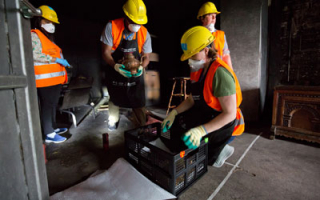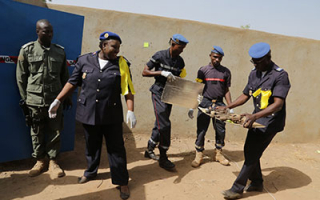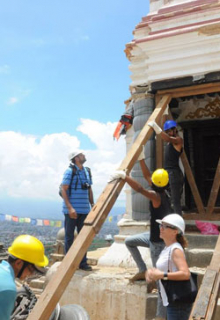Working language: English
Course Fee: € 900
Scholarships: Once selected, participants who are unable to secure funding from other sources can apply for a partial or full scholarship.
Organizing partners
- ICCROM, International Centre for the Study of the Preservation and Restoration of Cultural Property, Rome
- Prince Claus Fund, Cultural Emergency Response Programme (CER), the Netherlands
- Smithsonian Cultural Rescue Initiative, Smithsonian Institution, USA
- Swedish Postcode Foundation
In cooperation with Italian cultural heritage and emergency management institutions.
This training activity is being offered in the framework of international project,
Culture CannotWait: Heritage for Peace and Resilience, generously supported by the Swedish Postcode Foundation.
FAC 2019: A unique opportunity to learn and practice
Culture cannot wait. Whether it is the rescue of the ancient manuscripts in besieged Timbuktu or the careful salvage of destroyed temples in the earthquake that struck the Kathmandu Valley, affected communities will always strive to protect their cultural heritage following an emergency. But where does one start?
Are you interested in learning how to safeguard cultural heritage in times of crisis? Targeted at professionals working in the fields of humanitarian assistance, civil protection, military and disaster risk management, and those working in the field of cultural heritage, First Aid to Cultural Heritage in Times of Crisis (FAC) 2019 offers an interconnected learning and field-application opportunity.
The training is based on a field-tested three-step framework for cultural heritage first aid, which can be adapted to any emergency context, whether conflict or disaster. The guiding philosophy of the training is to interlock cultural first aid with humanitarian assistance in order to promote inclusivity and respect for diversity. Together, we will develop a culture of preparedness, ongoing risk management, collaboration and coordination in order to build disaster resilient communities.
Key features of the training
- 2-month (August – September 2019) online mentoring during which participants will learn key concepts using the First Aid to Cultural Heritage Handbook, carry out a situation analysis of their own context and outline their post training field projects.
- 4-week workshop (11 November – 5 December 2019) at ICCROM, Rome, where participants will learn and practice how to provide first aid to different types of cultural heritage in order to promote early recovery (see video). The fourth and final week will focus on self-study and presentation of participants’ follow-up projects before a jury. Five to ten projects will be selected for post-course implementation.
- 6-month post course follow-up (15 December 2019 – 15 May 2020) during which mentors will closely work with the participants to implement the field projects and help gather success stories and useful tools for an online publication.
Teaching team
The multi-disciplinary and international teaching team includes professionals who have been dealing with rescue and safeguarding of heritage in emergencies, are tasked with managing emergencies or providing humanitarian assistance, and have facilitated rescue operations.
Five to six mentors strengthen the core teaching team. Mentors are drawn from FAC alumni network of cultural first aiders. They have prior experience of providing cultural heritage first aid and have trained others.
What will you learn?
At the end of the training, participants will be able to:
- Identify strategies for integrating emergency preparedness and response for cultural heritage into their respective local systems for emergency management and humanitarian assistance;
- Analyze a given emergency situation, and work with the relevant actors and stakeholders to provide cultural heritage first aid;
- Recognize different values associated with at-risk cultural heritage in an emergency, and use their understanding to prioritize and provide ethical cultural heritage first aid;
- Carry out on-site damage and risk assessments for cultural heritage in emergency situations, while being familiar with basic requirements of safety in crisis situations, ensuring the safety of cultural first aiders;
- Secure, salvage and stabilize a variety of cultural materials and structures;
- Create effective teams in order to communicate and coordinate with multiple actors in a given emergency context;
- Understand how data on damage, risk and needs collected during cultural heritage first aid can be used to promote early recovery of the affected heritage and its associated communities.
Who can apply?
We seek motivated professionals who can put knowledge into practice and are proactive in sharing knowledge in and outside their own work context. Applicants from risk-prone areas, who have innovative ideas on how to use cultural heritage for building resilient communities, are especially encouraged to apply. Furthermore, priority is given to applicants with 3-5 years of professional experience (mid-career). Applicants have one or more areas of experience, such as:
- Working in the areas of disaster risk management, civil defence, military and humanitarian assistance; protection of cultural heritage should be one of their key concerns;
- Working in the field of cultural heritage (NGOs and public institutions).
Professionals who are engaged in community-based disaster risk management through their respective institutions/voluntary networks or have ongoing projects for protecting cultural heritage from conflicts or disasters are encouraged to apply.
Language: Participants should be able to converse and write in English. However, the ability to work and communicate in a multicultural setting is highly desirable.
Maximum intake: 16 participants
Please note this course is very time-intensive, including simulations, sites visits, evening programmes and excursions. We ask a full commitment of the participants’ time during the course.
How to apply?
- Please download the application form. Send it to fac2019@iccrom.org by 31 May 2019
- Please note that only complete applications will be taken into consideration.
- Short listed candidates will be invited for a Skype interview with the organizers and mentors in the second week of June 2019.
- A final selection of participants will be communicated by 15 July 2019 at the latest.
Scholarships, course fee, travel, accommodation and living expenses
A limited number of scholarships are available for selected participants who have demonstrated a financial need, and are unsuccessful in securing necessary funding from their institutions. A scholarship may include:
- (Part of the) course fee;
- Economy airfare to and from Rome, Italy;
- Accommodation and three meals per day for the duration of the course;
- Local transportation related to course activities and excursions.
The regular course fee is € 900 and includes course materials, coffee breaks and lunches during the course sessions, site visits and excursions.
Participants who are not eligible for scholarships will need to secure their own course fee and additional living expenses (approx. € 1 750) and are encouraged to seek financial assistance. The organizers can advise in this matter and are able to assist with affordable hotel options, for example.
"Our cultural heritage is what binds people together and creates unity. Destruction of our cultural heritage is an increasing problem due to natural disasters but also due to increasingly becoming a strategic target in armed conflicts. We are therefore really proud to support ICCROM in the work to train cultural first aiders in order to protect heritage during complex emergencies," says Marie Dahllöf, Secretary in General of The Swedish Postcode Foundation.
Testimonials
Lama Abboud, FAC alumna 2016. Architect, Master in Restoration Preservation & Rehabilitation, Syrian Architectural Engineering Syndicate
“Participants not only enhanced their knowledge but also started thinking differently about the role that cultural heritage can play in building peace in our society. Moreover, many cultural institutions and NGOs have asked me to replicate the course. I would like to highlight the importance of the international courses like FAC that, on one hand, help to build an international network of first aiders and on the other, generate excellent learning materials which help to rapidly transfer skills and knowledge in ongoing crises."
Alfred Topeka, FAC alumnus 2016, Department of Culture (Antiquities), Lilongwe, Malawi
“The Department of Culture has benefited a lot since a number of its staff have honed the skills of rescue and stabilization of cultural relics in times of crisis. This team shall be responsible for developing plans for rescue and mitigation of disasters that so frequently affect the country.”
Jonathan Eaton FAC alumnus 2015, Cultural Heritage Without Borders Albania, & Jovana Mijatovic FAC alumna 2015, Urban Development Centre Serbia
“We made many new professional contacts. These include the volunteers whom we trained (some of whom were new to us, while others we knew previously), as well as professionals from disaster response agencies in both Albania and Serbia. We also renewed previous contacts within the field of disaster response.”
Ihor Poshyvailo FAC alumnus 2015, Maidan Museum, Ukraine
“It was a starting point for professional dialogue, public and expert discussions and implementation of initial small practical but important and timely steps in professional and institutional capacity building in the field of emergency planning and cultural heritage preservation in Ukraine. International best practices and strategies on FAC as well as practical tools have become accessible in Ukraine.”




